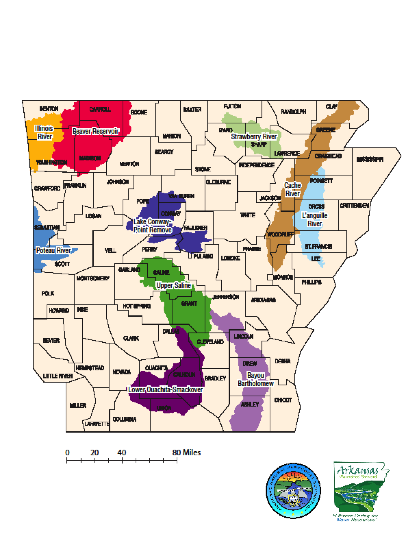Extension offering continuing education for Arkansas media and Conservation Districts
Fast Facts:
- Joint program includes hands-on water quality sampling activity
- Registration now open
LITTLE ROCK — Reporters working in watersheds impaired by nonpoint source pollution have an opportunity to brush up on their understanding of environmental science at three upcoming water quality seminars hosted by the University of Arkansas System Division of Agriculture. Simultaneously, Conservation District employees will have the chance to learn how to better communicate their stories to the media. The side-by-side workshops will take place in September and October in Little Rock, Monticello and Jonesboro.
The Nonpoint Source Pollution Media & Communications Seminar in September and October will be a chance for reporters and editors to learn about information resources in the state for water quality data and how waterways can become impaired.
At the seminar, participants will collect water quality samples alongside Conservation District employees who will spend the day with Extension faculty learning communication strategies. The joint program will also include a morning panel discussion about media and conservation practices.
Takeaways from the seminar for members of the media include:
- Sources for future water quality stories
- Better understanding of how water samples are collected and analyzed
- Ideas for local stories on water quality
Conservation District members will learn strategies from Extension faculty about:
- Making a short video using smart phones, iPads and an editing app
- Tips for using social media
- Writing effective press releases
By the end of the day, Conservation District employees will have either a short video to post online or a draft press release about the event using skills learned earlier in the day. This free educational program is aimed helping local Conservation Districts and media representatives form relationships that support better communications of water quality issues.
Registration is now open at http://forms.uada.edu/nps. The seminar is free to attend and lunch is included.
The goal of this free educational program, sponsored by a grant from the Arkansas Natural Resources Commission, is to help media representatives and local Conservation Districts form relationships that support better communications of water quality issues.

The seminar will be offered on three different dates, with sessions starting at 8:30 a.m. and ending at 4:30 p.m.:
- Sept. 3, 2015 – Little Rock - Cooperative Extension Service state office
- Oct. 1, 2015 – Monticello – University of Arkansas at Monticello, University Center
- Oct. 15, 2015 – Jonesboro – Arkansas State University, Alumni Center
Participants should bring their own laptop, and boots that can get wet. For more information about the program, contact Kristin Higgins at 501-671-2160 or e-mail khiggins@uada.edu.
With stakeholder input and water quality data, the Arkansas Natural Resources Commission has identified 10 priority watersheds impaired by nonpoint source pollution. These watersheds receive priority consideration for education and restoration or prevention efforts. The map below shows the location and breadth of these impaired watersheds.
Pursuant to 7 CFR § 15.3, the University of Arkansas System Division of Agriculture offers all its Extension and Research programs and services (including employment) without regard to race, color, sex, national origin, religion, age, disability, marital or veteran status, genetic information, sexual preference, pregnancy or any other legally protected status, and is an equal opportunity institution.
# # #
Media Contact: Mary Hightower
Dir. of Communication Services
U of A Division of Agriculture
Cooperative Extension Service
(501) 671-2126
mhightower@uada.edu
Related Links